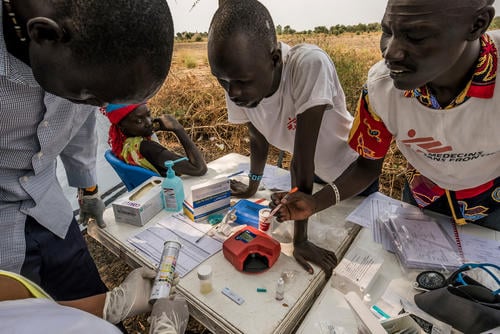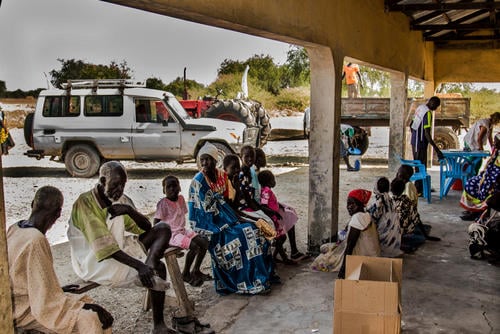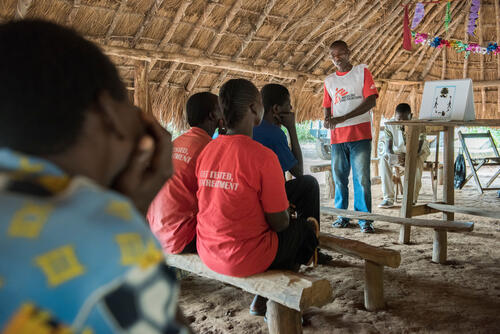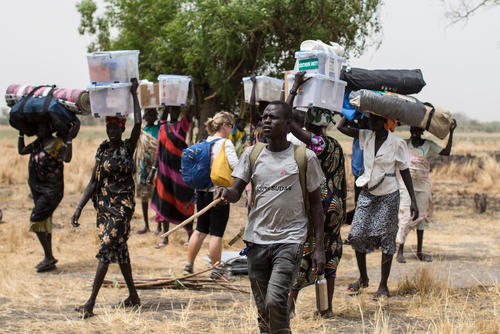It’s 8am, and the MSF compound in Akobo, eastern South Sudan, is a hive of activity. In front of the logistics tent, staff carefully load tables, chairs, floor mats, septic boxes, medicines and other supplies into the back of a vehicle. Nearby, the Project Coordinator manages to simultaneously gulp down a cup of coffee while mumbling into a dusty handset radio. With still-unbuttoned life jackets resting squarely on their shoulders, a team of clinical officers, nurses, and community health workers discuss the day’s strategy.
By the time the South Sudanese sun manages to break through Akobo’s final layer of foliage, the compound is quiet and the MSF mobile team is already cruising up the Pibor River. Their destination: a remote village where no other health services exist.
Since December 2013, millions have been, and continue to be, displaced as a result of South Sudan’s current conflict. In Akobo, people fleeing from nearby conflict zones arrive on an almost-daily basis. Some of our patients tell us how they make the several-day journey by foot and only walk at night when the fighting temporarily subsides.
Women and children make up much of the displaced community. While some manage to settle in with family or friends, others have no other option but to stay at the nearby primary school, where they have little access to food or water. Many are mentally traumatised after seeing their husbands, fathers, and brothers killed amid the insecurity.
Because of the ongoing conflict and resulting displacement, the medical and humanitarian needs in the region are enormous. It is in this context that MSF launched its newest project in South Sudan. Responding to the needs of both the host community and displaced population, MSF is now conducting mobile clinics that travel by boat or by car to provide basic healthcare where it is most needed.
“Akobo and the nearby villages are almost entirely cut-off from reliable, quality healthcare,” says Raphael Veicht, MSF’s Head of Mission in South Sudan. “Because medical facilities in the area have been abandoned or repurposed for other uses, this already highly vulnerable population has nowhere to turn to for basic treatment,” he adds.
The medical team that left early in the morning has now arrived in Kier, an hour’s boat journey away. As usual, they bring their equipment to rest under the shade of a few favorably positioned trees. Within minutes, the place is transformed into a basic healthcare clinic with a waiting area and makeshift tents used as private consultation spaces. Patients arrive and sit quietly on mats as they prepare to have their vitals taken, while nurse assistants ready medicines prescribed by clinical officers. After only two and a half hours, nearly 30 patients have been seen.
“We’ll usually see between 50 and 60 patients a day,” says Tut Kuang Ler, MSF clinical officer. “Today, six patients tested positive for malaria, five young children have diarrhoea, and we have one case of fungal infection.”
With mobile clinics now being held in seven different locations throughout former Akobo and Ulang counties, MSF medical teams are treating over 2,000 patients per month. Meanwhile, MSF has begun building a more permanent structure in Kier; a primary healthcare facility that will be able to provide more advanced care. But for now, the teams remain mobile.
At 2:30 in the afternoon, the last of the patients have passed through the clinic. Tut Kuang Ler pauses and gives one more glance around the adjacent field, scanning for any late arrivals. None. “Time to pack up and head back to Akobo,” he says.






